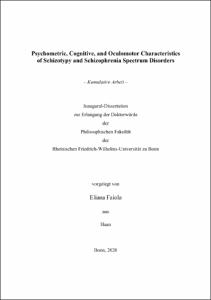Psychometric, Cognitive, and Oculomotor Characteristics of Schizotypy and Schizophrenia Spectrum Disorders

Psychometric, Cognitive, and Oculomotor Characteristics of Schizotypy and Schizophrenia Spectrum Disorders

| dc.contributor.advisor | Ettinger, Ulrich | |
| dc.contributor.author | Faiola, Eliana | |
| dc.date.accessioned | 2020-12-08T10:14:17Z | |
| dc.date.available | 2020-12-08T10:14:17Z | |
| dc.date.issued | 08.12.2020 | |
| dc.identifier.uri | https://hdl.handle.net/20.500.11811/8834 | |
| dc.description.abstract | Schizophrenia spectrum disorders are considered to be among the most severe mental health issues. However, the question of their etiological mechanisms is still unsolved and requires further research. One promising approach in this context is the study of schizotypy, defined as a temporally stable set of personality traits that mimic symptoms of schizophrenia in an attenuated, subclinical form. Comparing schizotypy to the full-blown clinical disorder can help identify etiological mechanisms, including both risk and protective factors. In this thesis, I provide a detailed overview of schizotypy, including its psychometric characteristics, introduce cognitive and oculomotor continuities between schizophrenia spectrum disorders and schizotypy, and summarize discontinuities suggesting the operation of protective mechanisms in schizotypy. Subsequently, I present four original studies that build upon previous findings and fill relevant gaps left by prior research: In a psychometric study, network analysis was applied to resolve previously reported inconsistencies in one of the most widely used schizotypy questionnaires. In a behavioral investigation, I examined how schizotypy was related to cognitive functions and whether this was affected by experimentally induced sleep deprivation, a manipulation that is considered to evoke transient schizophrenia-like behaviors and experiences. In two studies combining eye tracking with psychophysical approaches, functional magnetic resonance imaging, and machine learning, I examined the cognitive, perceptual, and neural mechanisms of altered smooth pursuit eye movements (an oculomotor marker of schizophrenia) in schizotypal individuals and schizophrenia spectrum patients. Together, the studies of the present thesis indicate that similarities between schizotypy and schizophrenia spectrum disorders are selective and may be found in basic, specific sub-components of complex, high level functions rather than in the complex functions themselves. This interpretation corroborates the hypothesis that protective mechanisms operate in schizotypal individuals, suggesting that such mechanisms prevent schizotypes from displaying the full phenotype of schizophrenia spectrum disorders. Additionally, embedding the original studies presented in this thesis into previously published research, it appears that different schizophrenia like characteristics might develop in a highly differentiated fashion along a continuum from low to high levels of schizotypy. Accordingly, more advanced expressions of schizotypy might be associated with a wider range of schizophrenia-like characteristics compared to less intense expressions. | en |
| dc.language.iso | eng | |
| dc.rights | In Copyright | |
| dc.rights.uri | http://rightsstatements.org/vocab/InC/1.0/ | |
| dc.subject | Schizotypie | |
| dc.subject | Schizophrenie | |
| dc.subject | kognitive Funktionen | |
| dc.subject | glatte Augenfolgebewegungen | |
| dc.subject | Eyetracking | |
| dc.subject | funktionelle Magnetresonanztomographie | |
| dc.subject | Netzwerkanalyse | |
| dc.subject | Schizophrenia | |
| dc.subject | Schizotypy | |
| dc.subject | Cognitive Functions | |
| dc.subject | Smooth Pursuit Eye Movements | |
| dc.subject | Eye Tracking | |
| dc.subject | functional magnetic resonance imaging | |
| dc.subject | Network Analysis | |
| dc.subject.ddc | 150 Psychologie | |
| dc.title | Psychometric, Cognitive, and Oculomotor Characteristics of Schizotypy and Schizophrenia Spectrum Disorders | |
| dc.type | Dissertation oder Habilitation | |
| dc.publisher.name | Universitäts- und Landesbibliothek Bonn | |
| dc.publisher.location | Bonn | |
| dc.rights.accessRights | openAccess | |
| dc.identifier.urn | https://nbn-resolving.org/urn:nbn:de:hbz:5-60549 | |
| ulbbn.pubtype | Erstveröffentlichung | |
| ulbbnediss.affiliation.name | Rheinische Friedrich-Wilhelms-Universität Bonn | |
| ulbbnediss.affiliation.location | Bonn | |
| ulbbnediss.thesis.level | Dissertation | |
| ulbbnediss.dissID | 6054 | |
| ulbbnediss.date.accepted | 09.11.2020 | |
| ulbbnediss.institute | Philosophische Fakultät : Institut für Psychologie | |
| ulbbnediss.fakultaet | Philosophische Fakultät | |
| dc.contributor.coReferee | Klein, Christoph |
Files in this item
This item appears in the following Collection(s)
-
E-Dissertationen (712)




